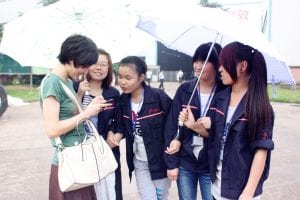Bridging the gap: social media use in China
By Sophie Vinter, on 13 September 2016
 “While ‘Made in China’ products have become pervasive in our daily lives, the people who produce them remain mysterious. However, our research reveals that Chinese factory workers actually exhibit an unexpected and sophisticated use of social media to bridge the gap between their rural roots and their industrial lives.”
“While ‘Made in China’ products have become pervasive in our daily lives, the people who produce them remain mysterious. However, our research reveals that Chinese factory workers actually exhibit an unexpected and sophisticated use of social media to bridge the gap between their rural roots and their industrial lives.”
Author Xinyuan Wang is referring to her new open-access book, Social Media in Industrial China, which launched on 13 September along with its sister title Social Media in Rural China in a special online broadcast from Hong Kong University.
A PhD candidate at the UCL department of anthropology, Xinyuan spent 15 months undertaking fieldwork in a small factory town in southeast China, living in one of the factories and tracking the workers’ use of social media.
By studying this marginalized population – who have, in many ways, embraced the potential of social media to the fullest – her in-depth research sheds light not just on Chinese social media usage, but also on the nature of contemporary China.
Xinyuan’s research is part of the UCL-led global social media impact study, ‘Why We Post’, which The Economist has described as “the biggest, most ambitious project of its sort.”
From 13-23 September Xinyuan is joining Professor Daniel Miller, the lead researcher of Why We Post, and fellow author Tom McDonald, who received his PhD from UCL anthropology and is currently an associate professor at Hong Kong University, in giving a series of talks about the project in nine top universities in Hong Kong, Guangzhou, Beijing and Shanghai.
Social media as education
 Why We Post saw a team of nine anthropologists each spend 15 months living in villages or towns in eight different countries.
Why We Post saw a team of nine anthropologists each spend 15 months living in villages or towns in eight different countries.
As well as two fieldsites in China, locations included a town on the Syrian-Turkish border, low income settlements in Brazil and Chile, an IT complex set between villages in South India, small towns in south Italy and Trinidad and a village in England.
In China, Xinyuan found that social media is playing a key role in filling the gap left by the lack of education and schooling. She said: “For young migrant workers who dropped out of school early and became factory workers before adulthood, social media is the ‘post-school’ education and this schooling implies their ‘coming of the age’.
“For many migrant workers, social media is less of a bridge that connects with what they have left behind in villages, than a projector which illuminates an ideal modern life these people are longing for. Therefore it is a study of two paralleled migrations: one from rural to urban, but simultaneously another migration from offline to online.”
Open access
All the books from Why We Post are being published by UCL Press as open access in 2016-2017.
Xinyuan added: “The free online knowledge provided by Open Access allows the possibility of a significantly extended readership, which is extremely important for books focusing on how the digital can possibly change the lives of marginalised populations and low income populations.
“To bring this knowledge of Chinese social media in the context of the global comparative study back to China is a big commitment the project aims to make, with the ultimate goal of free global education.”
- Watch the live book launch
- Find out more about Why We Post
- Read more UCL Anthropology news
 Close
Close

